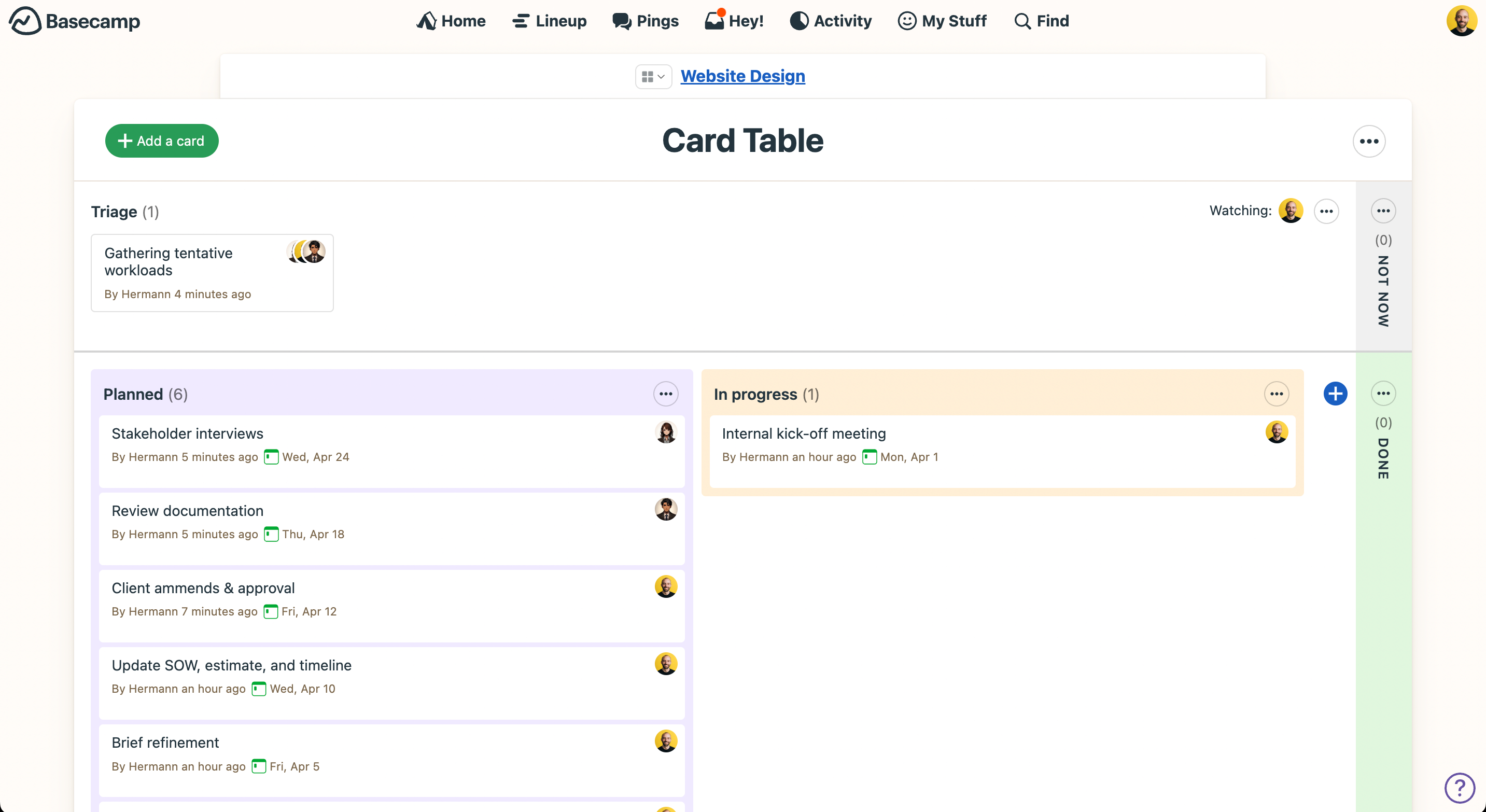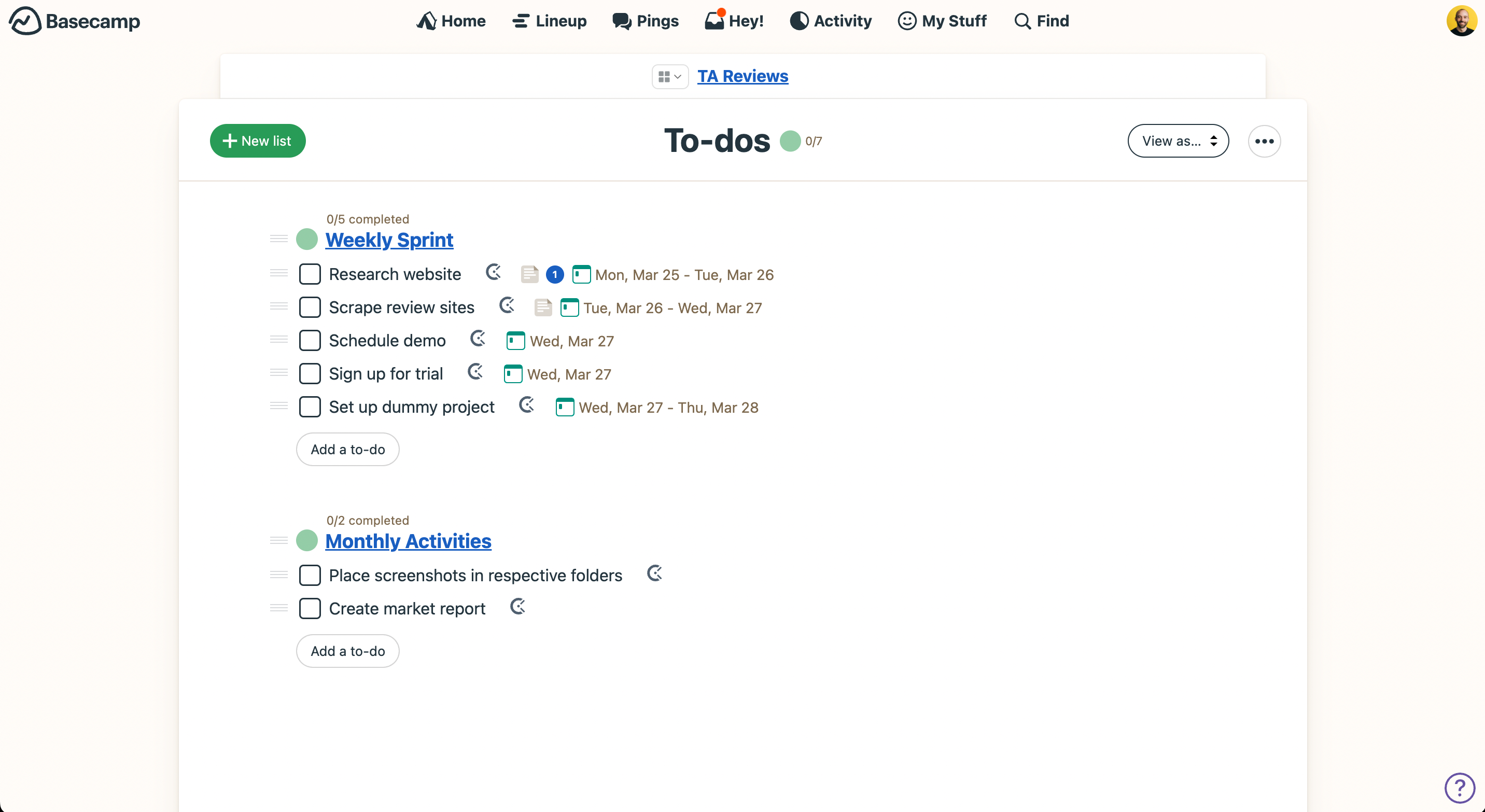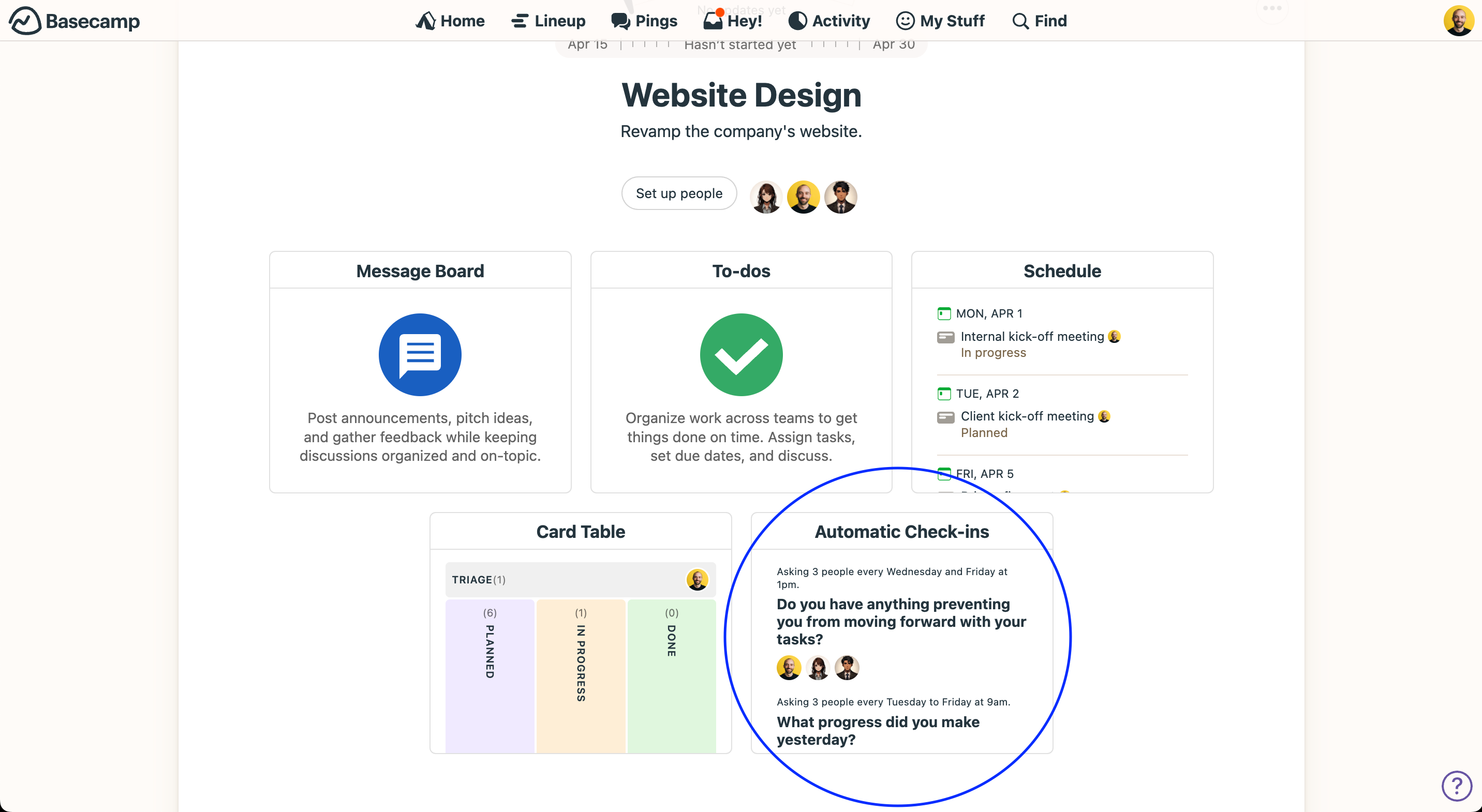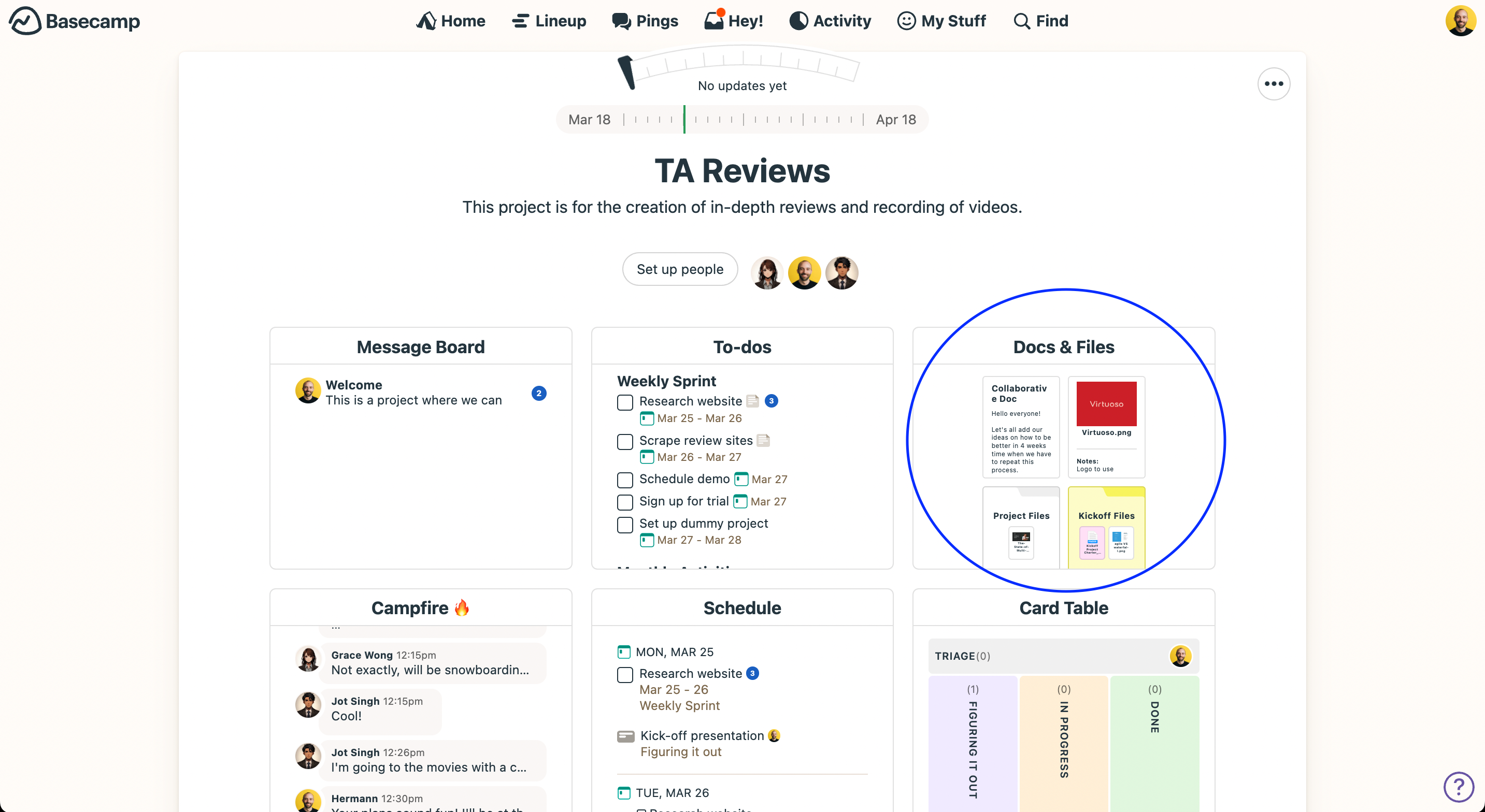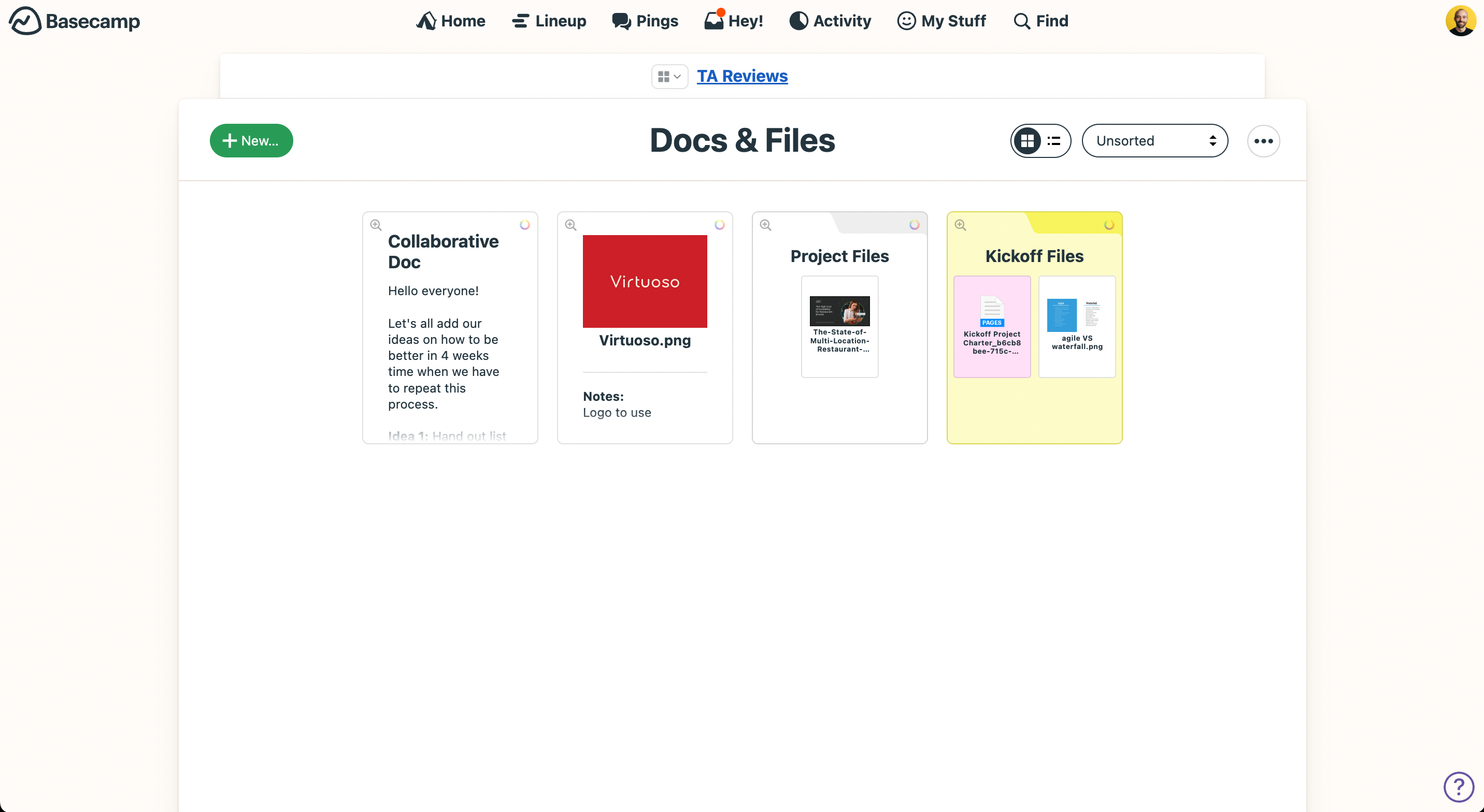In this in-depth review of Basecamp, I'm sharing the results of dozens of hours spent training myself to use the tool, talking to project managers who use it, and having conversations with experts so that you have an easier time figuring out if this software is for you.
But before I dive in, if this is the start of your tool search journey and you are trying to decide which tool to choose, I recommend starting with this list of the best project management software. Once you narrow down your options, come back for more in-depth coverage of the tool.
As we go through the different sections, expect to see lots of commentary, personal opinions, screenshots, and videos that will help you get to know Basecamp beyond what they display on their website.
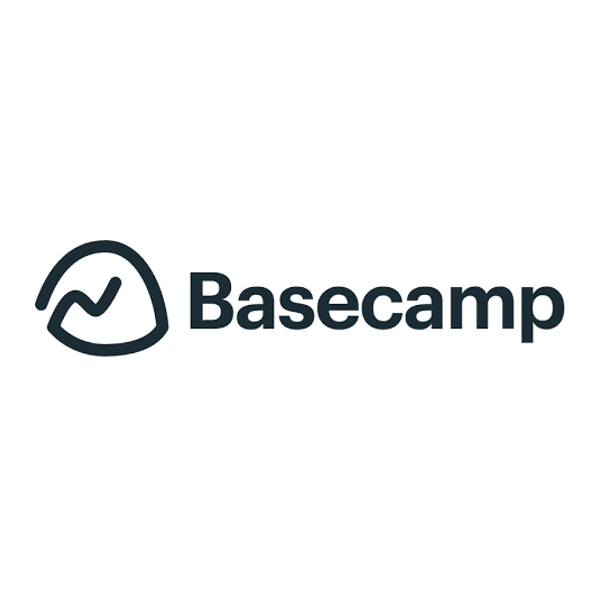
Summary
Basecamp is a project management software and online collaboration tool that helps you simplify project tracking. Through features like to-do lists, message boards, chats, and card tables (Kanban boards), it can help you centralize project work, reduce the number of external communication tools you use and improve organizational transparency.
The tool has plans for both small businesses and growing companies that require more users and would like to have unlimited users for a fixed monthly price.
Price: From $15 /user/month
Trial: 30-day free trial
Pros
👍 You have an internal chat that you can use to keep focused conversations within the project.
👍 All items are created private by default and you give permissions to whomever you see fit.
👍 Its paper-stack interface makes it easy and intuitive to navigate.
👍 It has keyboard shortcuts you can use to navigate anywhere using only your keyboard.
Cons
👎 It’s missing a traditional grid/list view which can be confusing for some PMs.
👎 Lacks a traditional timeline view where you can visually follow tasks and their dependencies.
👎 It has basic reporting features as it relies on clients following your work more closely.
Why Trust Our Project Management Software Reviews
We’ve been testing and reviewing project management software since 2012. As project managers ourselves, we know how critical and difficult it is to make the right decision when selecting software.
We invest in deep research to help our audience make better software purchasing decisions. We’ve tested more than 2,000 tools for different project management use cases and written over 1,000 comprehensive software reviews. Learn how we stay transparent & our project management review methodology.
Are You a Good Fit for Basecamp?
Who would be a good fit for Basecamp?
In my assessment, Basecamp is particularly well-suited for:
- Small to medium-sized businesses: These organizations benefit from Basecamp's straightforward design and ease of use, which are ideal for managing projects without the complexity of more robust software.
- Industries valuing communication and collaboration: Fields like marketing, creative agencies, and education find Basecamp’s focus on communication tools like message boards and Campfires especially valuable for team collaboration.
- Teams preferring simplicity in project management: Teams that require a clear, uncomplicated approach to task tracking, file sharing, and project scheduling find Basecamp's features adequately meet their needs without overwhelming them with too many options.
Who would be a bad fit for Basecamp?
Conversely, Basecamp might not be the ideal fit for:
- Industries requiring detailed analytics and reporting: Sectors like large-scale IT and engineering, which need in-depth reporting and data analysis, may find Basecamp's basic reporting capabilities insufficient.
- Companies with workflow automation needs: Workflow automation within Basecamp does not have a dedicated module for it. Therefore, companies needing a database of rules they can turn on/off should look elsewhere.
Core Project Management Features
Task Management ⭐️⭐️⭐️
Task management in Basecamp is good, but not great. The reason being its lack of dependencies, milestones, and timeline views which make it a bit harder to give it a great score in this criterion.
Another contributing factor is the disconnect between to-dos and the cards in the card table. Unfortunately, there is no way of seeing your tasks in a list form and then changing views to see those same tasks in many formats.
On a positive note, to-do lists are intuitive to build and provide lots of information at a glance. Adding notes to a task will display a 🗒️ icon next to the task. The same goes for conversations within tasks (adds a 🔵 ) and assigned dates (adds a 📅).
And if you work with Kanban, the card table section of the project will help you create and handle task flows. Shoutout to the triage status in this view as it helps you gather tasks that require some information exchange and brainstorming.
Finally, to-do list templates will help you speed up project setup. The way it works is you create to-do lists that cover the basic structure of a project that repeats every time, save them, and use them as you create new projects.
Collaboration Tools ⭐️⭐️⭐️⭐️⭐️
Collaboration is at the heart of this tool. Honestly, there’s nothing I can criticize about their approach. Therefore, let me tell you all the ways you can collaborate.
You can have conversations per to-do item and to-do list, exchange important updates using the message board, and have Slack-like conversations using its chat feature. You even have the option of adding multiple chat spaces so your team can exchange information in a formal and informal (campfire) setting.
Basecamp also provides an additional tool called ‘Automatic Check-ins’, which helps you schedule questions you would like to ask to your team to keep them engaged throughout the project.
Time Tracking ⭐️⭐️
Unfortunately, time tracking is not natively built into this tool. Therefore, if you want to track time dedicated to tasks, you will have to do it through a door (their way of calling integrations).
You should also know that prior to testing this software, I had already installed a Chrome extension for Clockify, and Basecamp automatically added it as an option for me to record time within the tool. Still can’t figure out how it got that one since it’s not listed as a tool they can integrate with. It just knew 🤯.
Resource Management ⭐️⭐️
If you are expecting workload views, this is not the tool that will help you manage resources that way. Basecamp allows you to track anyone in the organization by clicking on their profile pic or going to the activity tab.
Once you do that, you will see a screen where you can filter by latest activity, assignments, overdue items, and to-dos added & completed.
Document Management ⭐️⭐️⭐️
As with any other project management software, Basecamp allows you to attach files to any to-do item or card. Once you attach a file, it will automatically display previews of known extensions, like .pdf and .png. If it does not recognize the file, it will assign an icon and only make it visible as an attachment.
In addition to these per-item attachments, each project has a Docs & Files section you can add to it when you create the project. However, contrary to your intuition, this space will not centralize all docs it finds in different tasks across the project. Docs & Files operates independently and you can use it to create your own hierarchical attachment structure based on folders.
Therefore, managing documents within Basecamp requires some thinking before starting a project so you can guide your team toward successfully using this feature.
Basecamp Standout Features ⭐️⭐️⭐️
The features that deserve a special mention in my opinion are its project stacks and Hill charts.
Project Stacks
Project stacks are a quick and easy way to group projects so you can easily track a portfolio. This feature allows you to group similar projects by simply dragging one over the other in the home view.
Once stacked, you assign an icon, name it, and it will create a "folder" of projects. You can then drag as many projects as you want into it, making them live under the same roof.
I see this as a valuable tool for PMs who handle dozens of projects. Project stacks allow them to find related projects more easily, reducing the time spent searching.
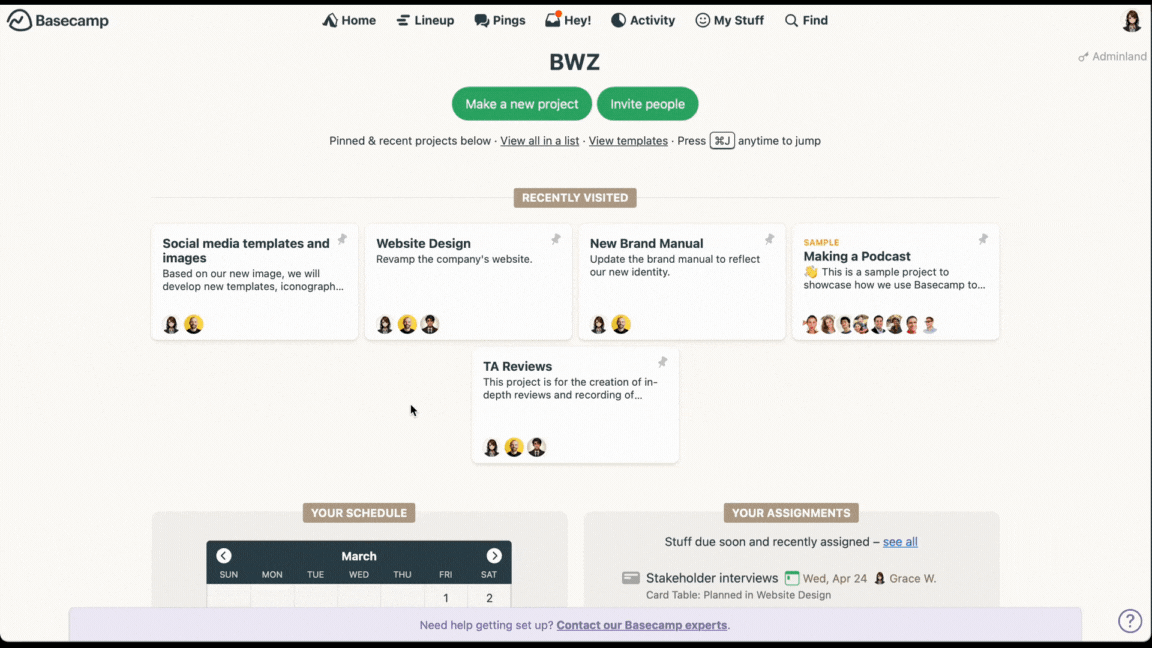
Privacy Settings
Privacy is at the forefront of every work item in Basecamp. Therefore, every project, to-do item, card, or attachment you add will only be visible to you by default. That way, the system ensures your information remains private until you decide it shouldn't be.
Keep an eye out for fields at the bottom of any newly created item as they will let you select visibility (including if and how you would like to share it with the client 😉 ).
Hill Charts
Hill Charts are a creative way in which Basecamp has built a project tracker. This interactive report is populated manually by the tasks you select that should be in it (maybe milestones?) and gives you a bird’s-eye view of projects so you can see what’s moving forward, what’s stuck, and what’s done.
It's important to note that this Hill Chart lives within the TO-DO section of the project and can only track to-do items. And because I know you were wondering, the reason for it being manually updated is that not all items in a checklist are made equal. Sometimes, you may have finished 3/5 tasks, but the fourth one is the one that really moves the needle toward completion.
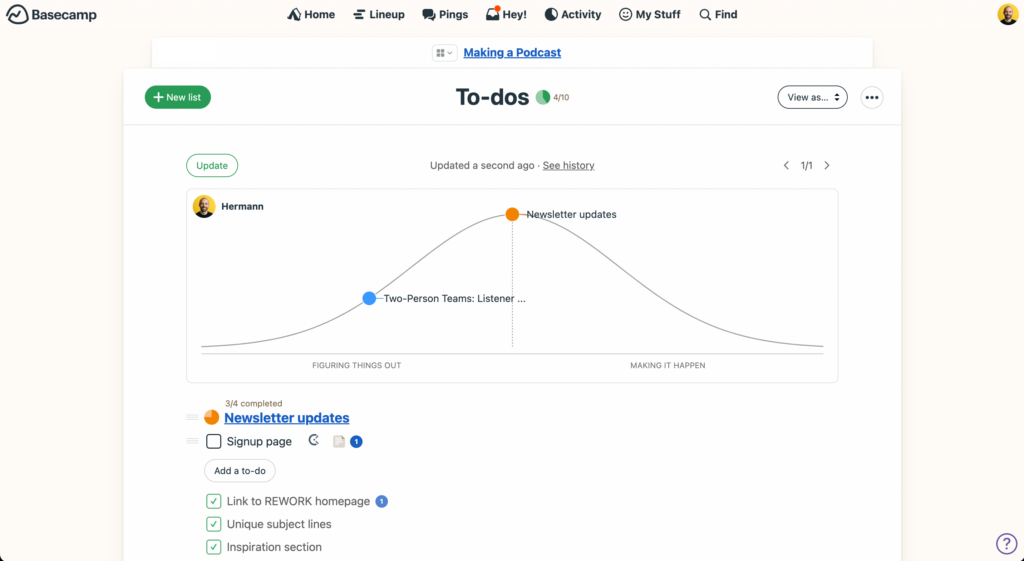
Other Evaluation Criteria
Ease Of Use ⭐️⭐️⭐️⭐️
Basecamp has to be hands down one of the easiest tools I've ever used. I say that for two reasons. First, navigating the software is extremely intuitive. You can tell the product team has given a lot of thought to the wording used and the natural ways in which we expect the UI to behave.
Second, the training videos help you feel like an expert in under 2 hours. The training videos are very helpful and introduce features slowly and in a logical sequence that makes you feel like you can quickly master the tool.
Onboarding ⭐️⭐️⭐️⭐️⭐️
The onboarding experience was way more simple than other tools, yet made me feel the most comfortable using the software without hesitation. As soon as you finish signing up, you are greeted with a welcome letter from the CEO and a direct line of communication with him, should you have any questions.
Then, when you go to the home screen, you quickly see two items pinned to your space:
- A Getting Started guide with starter information and a link to the training videos I've been mentioning throughout this review.
- A sample project that shows how the team at Basecamp uses the software to coordinate their podcast recording efforts.
These two items give you enough confidence to start creating your first project and explore the tool.
Customer Support ⭐️⭐️⭐️⭐️
Access to the customer support team at Basecamp is available in-app by clicking on the (?) button located in the bottom-right corner. After just a couple of prompts, you can fill in a form and write your concerns. You can also access a similar form by going to this website.
One difference I noticed is that the website explicitly mentions they will get back to you within an hour while the in-app form says they usually reply "in a few hours", and I think I found out why.
Their customer support automated emails after you send a request have a breakdown of their service. They run on a full team from Mon-Fri which helps them deliver 24/5 at full steam. However, weekends have a reduced team that can take longer to reply.
Integrations ⭐️⭐️⭐️
Basecamp is all about having their own names for things. Kanban boards are called card tables, chats are pings, and integrations... are called doors.
Opening a door can help you connect external software to Basecamp so you can reduce app-switching times. Doors include software like Miro, Hubspot, Adobe Creative Cloud, Invision, Slack, Notion, Salesforce, Zoom, Zendesk, and Calendly.
Not the most extensive library of integrations but it will help you get by.
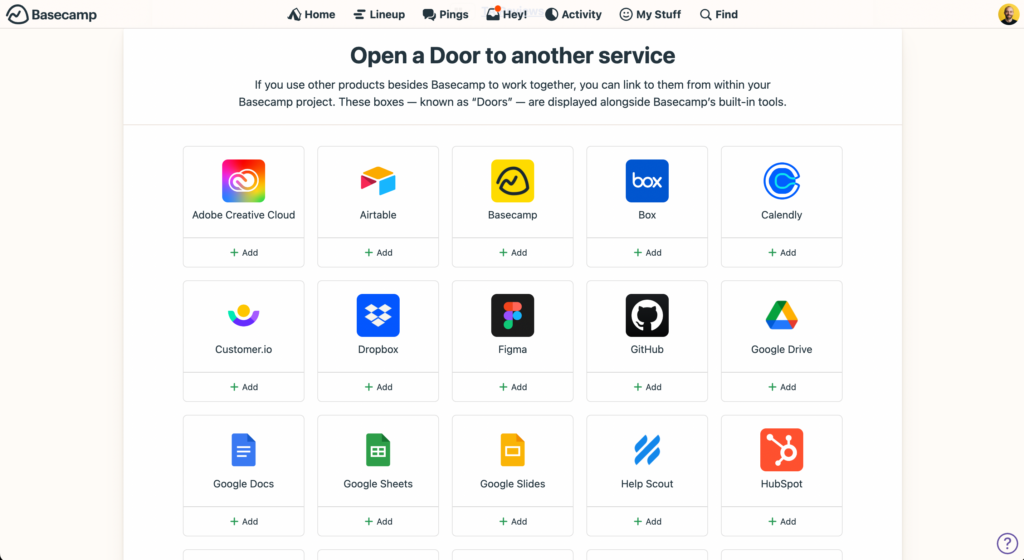
Value For Money ⭐️⭐️⭐️
Basecamp only has two paid plans. One where you pay per license per user and is aimed at small businesses, freelancers and startups. This plan includes all the key features like to-do lists, message boards, schedules, file storage, and automated check-in questions. There is no minimum seat requirement, making it suitable for teams of all sizes.
The second plan is for growing companies and it has a fixed price for unlimited users. This plan offers more granular permissions, improved customer support and increased storage.
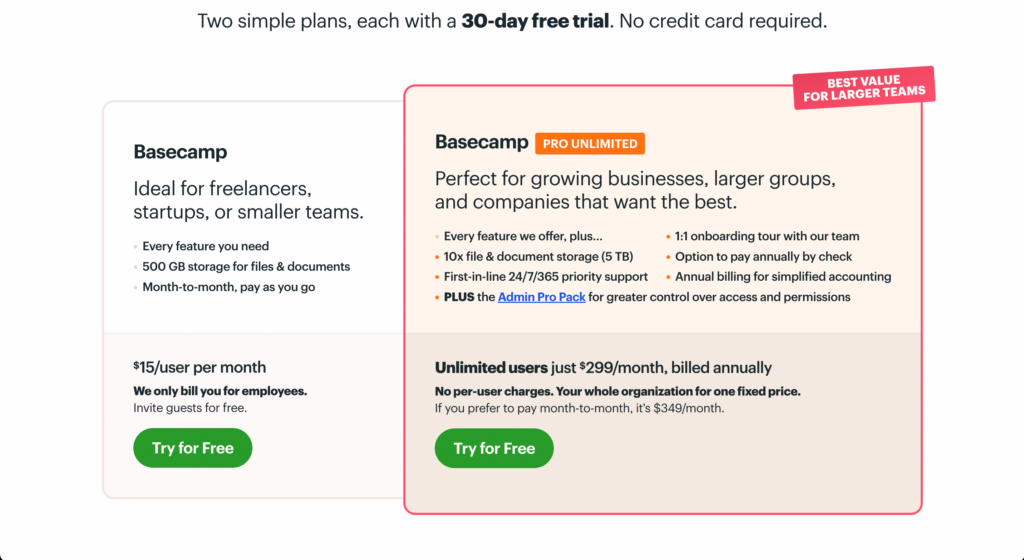
Overall value for money is high. The basic plan's value is palpable when you realize you have access to all features within the product. The Pro Unlimited plan delivers its value through having unlimited users at your disposal.
Basecamp: A Deep Dive
Product Specifications
| Task Assignment | Yes |
| Project Templates | Yes |
| Time Tracking | No |
| Gantt Charts | No |
| Kanban Boards | Yes |
| File Sharing | Yes |
| Calendar Integration | Yes |
| Reporting/Analytics | Limited |
| Collaboration Tools (Chat, Forums, etc.) | Yes |
| Email Integration | Yes |
| Mobile Access | Yes |
| Customizable Dashboards | No |
| Third-Party Integrations - Limited | Limited |
| Data Export/Import | No |
| Automated Notifications | Yes |
| Multi-Language Support | No |
| User Access Controls | Yes |
| Cloud Storage | Yes |
| Workflow Automation | Limited |
| Document Management | Yes |
| Issue Tracking | No |
| Budget Management | No |
| Resource Management | No |
| Risk Management | No |
| Client Access | Yes |
Basecamp FAQs
Here are some answers to frequently asked questions you may have about Basecamp.
Can Basecamp integrate with other tools?
Basecamp offers limited native integrations and provides an API for basic third-party connections.
Does Basecamp offer time tracking?
No, Basecamp does not include a built-in time-tracking feature.
Is Basecamp suitable for large companies?
Basecamp is best suited for small to medium-sized businesses; larger companies may find it lacks advanced features.
Can I customize workflows in Basecamp?
Basecamp offers limited customization options compared to other task management tools.
Is there a mobile app for Basecamp?
Yes, Basecamp provides a mobile app for both iOS and Android devices.
Does Basecamp offer a free trial?
Yes, Basecamp typically offers a free trial for new users to test its features.
How does Basecamp handle file storage and sharing?
Basecamp includes file storage and sharing capabilities, allowing centralized access to documents and files.
Are there different pricing tiers for Basecamp?
Basecamp usually offers a flat pricing structure, with details available on their website or upon request.
Basecamp Company Overview & History
Basecamp is a project management and team collaboration software company. It's widely used by a variety of companies, particularly small to medium-sized businesses. Basecamp is a privately held company, owned and operated by its founders, Jason Fried and David Heinemeier Hansson. The company's headquarters is located in Chicago, Illinois.
Notable personnel include the founders themselves, who are also known for their advocacy of remote work and company culture. Basecamp's mission is to provide simple, effective tools for better team communication and project management. Since its inception in 2004, Basecamp has undergone significant evolution, positioning itself as a user-friendly alternative to more complex project management systems.
Basecamp Summary: The Bottom Line
Basecamp stands out as a great project management platform, particularly for small businesses and teams. Its simplicity and user-friendly interface make it one of the best project management software for those new to such tools or managing simple projects. Unlike other tools, Basecamp offers unique features like real-time group chat and automatic check-ins, enhancing real-time communication and progress tracking, ideal for remote teams.
The free version, Basecamp Personal, is especially beneficial for small teams and nonprofit organizations, offering unlimited users and ample storage space. Its emphasis on ease of use, with a minimal learning curve, along with the ability to efficiently manage docs and milestones, sets Basecamp apart as a comprehensive yet straightforward project management solution.
Alternatives to Basecamp
- Trello: Best for teams looking for a visually intuitive and flexible Kanban-style task management experience.
- Asana: Ideal for organizations requiring more robust workflow customization and detailed project tracking.
- Monday.com: Suitable for those seeking extensive integration capabilities and advanced reporting features.
Summary
In conclusion, Basecamp offers a straightforward and user-friendly approach to project management, ideal for small to medium-sized teams focusing on communication and basic task management. While it lacks advanced features like detailed reporting and time tracking, its simplicity makes it a strong contender in its segment.
If you're looking for a tool that simplifies project management without overwhelming features, Basecamp is worth considering. I encourage readers to share their experiences and thoughts on Basecamp or other task management tools they've found effective.

